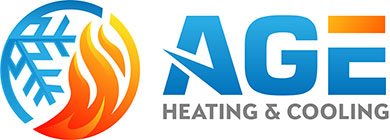
If you’re uncertain whether your Sandpoint residence has poor indoor air quality (IAQ), it possibly does.
We are indoors a lot. As a matter of fact, we’re indoors up to 90% of the time, according to the U.S. Environmental Protection Agency. And the air inside homes could be 2–5 times more polluted than outdoors, which can create long-term health concerns.
Most Common Causes of Bad IAQ
We’ve made a list of the most ordinary sources of bad IAQ, the problems they create and how you can fix these indoor air pollutants. If you’re concerned about the air inside your residence, we advise consulting with a specialist like Age Heating & Cooling about which solutions are ideal for your family.
Volatile Organic Compounds
Volatile organic compounds, or VOCs, are fumes leaked by everyday household items.
They’re found in paint and stains as well as:
- Furniture
- Carpet
- Building materials
- Cleaning products
- Cosmetics
- Air fresheners
- Candles
When these fumes accumulate inside, they might irritate your eyes, nose and throat. They might also cause headaches and nausea. Regardless of whether your residence is in a rural or industrial area, an EPA study found indoor levels of these pollutants can be 2–5 times worse than the air outside.
Always follow the manufacturer’s directions when applying paint or spraying cleaning products. Unlatching a window can help fumes disappear faster.
Air purification systems can also improve your air. This unit partners with your heating and cooling unit to improve indoor air. When looking for one, ensure it’s specifically made to eradicate VOCs.
Dust and Pet Dander
Dust and pet dander can trigger health problems like asthma and allergies, especially when it constantly gets recirculated by your home’s comfort system. While you can vacuum more routinely and install an improved air filter, an air filtration system might be a better fit.
This unit hooks to your heating and cooling equipment to give powerful filtration. Some types have hospital-level filtration for eliminating particles and bioaerosols.
Persistent Odors
Newer residences are securely sealed to boost energy efficiency. While this is good for your heating and cooling bill, it’s not so good for your IAQ.
Musty odors can stick around for a greater amount of time because your house is pulling in reduced fresh air. Since keeping your windows open all the time isn’t a possibility, here are two approaches you can make your indoor air smell fresher.
An air purification system is placed in your HVAC system to neutralize odors before they are redistributed. Search for one with a carbon filter and the power to break down harmful VOCs. These systems can also help keep your loved ones healthy by wiping out most bacteria and normal allergy triggers like pollen and mold spores.
A ventilation system takes out stuffy indoor air and substitutes it with crisp outdoor air. There are two models of units (heat recovery and energy recovery), so call our professionals for more info on which type is right for your house.
Uneven Humidity
It’s essential your house’s humidity keeps even. Air that has too much moisture can cause mold, while dry air can create respiratory issues.
Our specialists suggest 40–50% for top comfort. To keep yours in balance, consider getting a whole-home humidifier or whole-home dehumidifier with your HVAC system.
Rather than having to pull a humidifier from room to room, this equipment delivers consistent humidity around your house.
Carbon Monoxide
Carbon monoxide is colorless gas you can’t smell. It occurs when there’s insufficient combustion in fuel-burning units, like gas heating systems, water heaters or fireplaces.
It creates a serious health risk. In low levels, it can cause flu-like ailments like headaches and nausea. It can be lethal in big amounts.
We advise annual furnace maintenance to make sure your unit is working smoothly. This work allows our professionals to pinpoint troubles before they start, including malfunctions that can create carbon monoxide leaks.
The best method to keep your home free of carbon monoxide is to put in detectors. These alarms must be on each floor near bedrooms and living areas.
Improve Your Home’s Air Quality with the Age Heating & Cooling Specialists
Informed that your home has inferior air quality but not sure how to make it better? Or unsure which solution is best for you? Give our approachable HVAC professionals a call at 208-603-2210 or contact us online right away. With free estimates and expert assistance, we’ll help you find the ideal option for your needs and budget.







